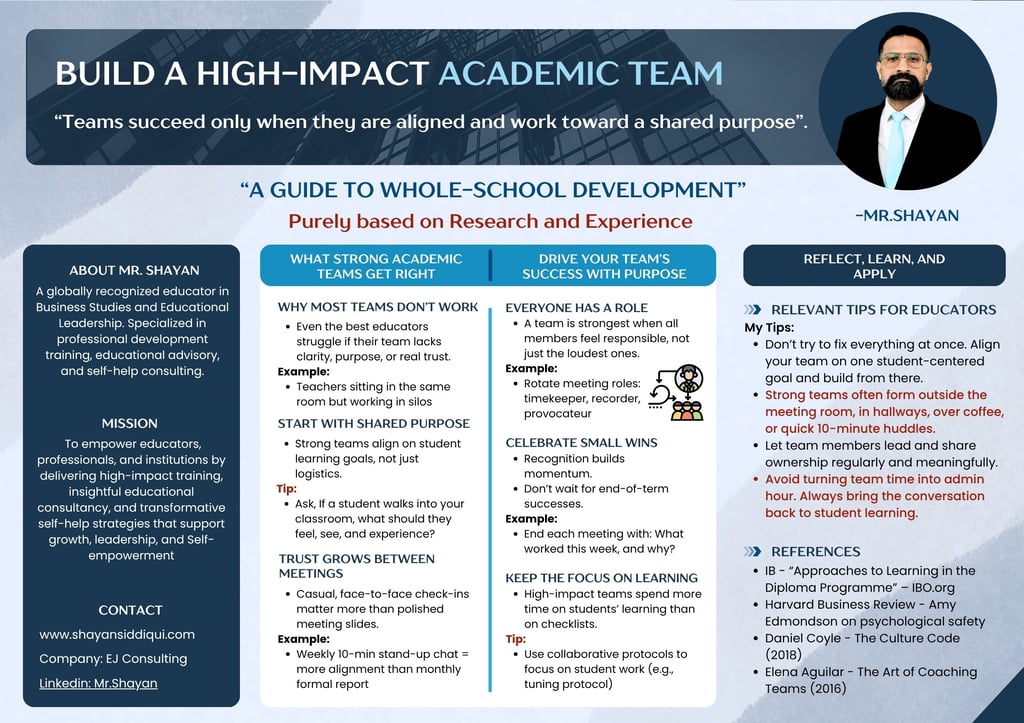
5 Proven Steps to Create a High-Performing Academic Team
In this article we have discussed practical strategies to build a high-impact academic team that boosts student achievement, strengthens collaboration, and thrives in IB and Cambridge school settings.
Mr. Shayan Siddiqui
8/12/20252 min read


Why Strong Teams Matter More Than Ever
In every successful school, whether IB, Cambridge, or hybrid, there’s a common thread: a strong academic team that works as one. A school’s reputation, student outcomes, and capacity for innovation depend less on individual brilliance and more on collective strength.
According to a McKinsey study, teams that function with high trust and shared purpose outperform others by up to 50% in productivity. In education, that productivity is not about profit margins — it’s about delivering richer learning experiences for students, sustaining teacher wellbeing, and creating a culture that attracts and retains talent.
1. Start With a Clear, Shared Vision
Every academic team needs a compass. IB has its mission statement; Cambridge has its learner attributes. But within your school, you need a team vision that speaks directly to your context, students, and community. Without it, even the most talented educators pull in different directions.
In Practice:
Facilitate a vision-setting session where team members co-create a one-page “academic charter” outlining shared goals, values, and non-negotiables for teaching and learning.
2. Select for Complementary Strengths, Not Just Credentials
A team full of high achievers with identical profiles can create bottlenecks and blind spots. High-impact teams balance subject expertise with skills in inquiry design, assessment innovation, pastoral care, and cross-curricular integration.
In Practice:
Map your team’s strengths using simple tools like a skills matrix. Identify gaps — for example, digital pedagogy expertise — and address them through targeted hiring or internal upskilling.
3. Build a Culture of Psychological Safety
Research from Google’s Project Aristotle found psychological safety to be the number one factor in high-performing teams. For academic teams, this means teachers feel safe to question policies, propose new ideas, and admit mistakes without fear of judgment.
In Practice:
Leaders can model vulnerability by openly sharing challenges they’ve faced and how they addressed them. Set aside dedicated meeting time for idea-sharing where all voices are heard.
4. Align Professional Development With Real Needs
Professional learning is most effective when it’s aligned to the team’s shared vision and individual strengths. Too often, training feels like a tick-box exercise, disconnected from daily challenges.
In Practice:
Conduct termly “learning needs check-ins” with each team member. Use the findings to design PD pathways that blend school priorities with personal growth goals.
5. Celebrate Wins Large and Small
Recognition is not a soft extra; it’s a driver of team morale and retention. Whether it’s a successful student project, a breakthrough in teaching strategy, or an innovative assessment design, celebrating together reinforces the team’s shared identity.
In Practice:
Create a simple tradition a “win of the week” segment in meetings, or a monthly digital newsletter highlighting team achievements.
Looking Ahead
A high-impact academic team doesn’t emerge by accident. It is intentionally built, nurtured, and sustained. In IB and Cambridge contexts, where collaboration, inquiry, and global-mindedness are core values, a strong team is not just an operational it’s a moral imperative.
The most effective leaders understand that investing in team culture is not a distraction from academic excellence; it is the foundation of it. The question is, what deliberate step will you take this term to elevate your team from good to exceptional?